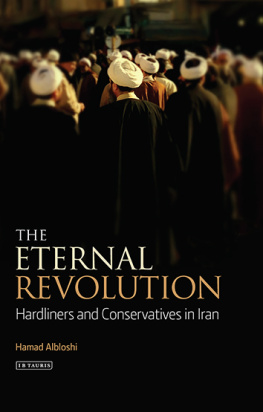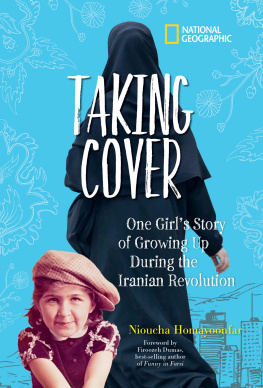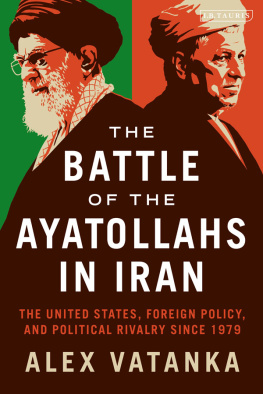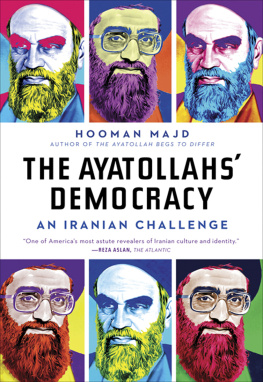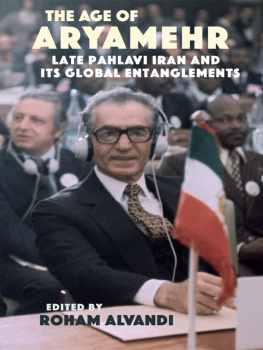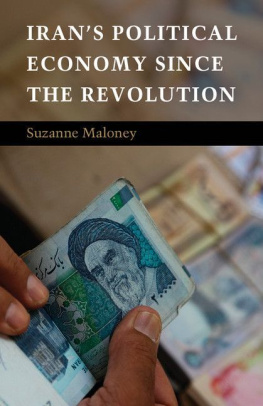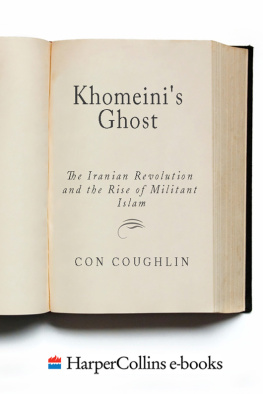More Advance Praise for The Lonely War
Nazila Fathis The Lonely War is both a touching personal story that illuminates the struggles of life in Iran and a broader reflection on the sociopolitical effects of the Islamic revolution on the Iranian people. With so much misinformation about Iran in the national discourse, Fathis book is a valuable resource for anyone looking to read beyond the headlines.
Hooman Majd, author of The Ayatollah Begs to Differ: The Paradox of Modern Iran
A poignant portrait of Irans tortured contemporary history through the eyes of one of the countrys most thoughtful and courageous journalists.
Karim Sadjadpour, Carnegie Endowment for International Peace
As fearless as it is honest, The Lonely War tells the inside story of how Iranians have grappled withand also been inspired bytheir Islamic Republic. Journalist Nazila Fathi gives us a powerful personal account of coming of age in revolutionary Iran, exploring Irans turbulent modern history through a remarkable cast of real characters, and deftly navigating Irans cultural and political divide to provide us a superb picture of what makes Iran today.
Scott Peterson, author of Let the Swords Encircle Me: IranA Journey Behind the Headlines
Drawing on more than a decade of reporting for the New York Times in Iran, Nazila Fathi has written a lucid and highly engaging portrait of Iranian politics from the 1979 revolution to today. One of the books most illuminating features is her vivid portrait of the impoverished recruits for the paramilitary Basij and Revolutionary Guard Corpsincluding their subsequent disillusionment and adoption of a more middle class, secular life style. Highly recommended for college courses.
Janet Afary, author of Sexual Politics in Modern Iran
THE LONELY WAR


Copyright 2014 by Nazila Fathi
Published by Basic Books,
A Member of the Perseus Books Group
All rights reserved. No part of this book may be reproduced in any manner whatsoever without written permission except in the case of brief quotations embodied in critical articles and reviews. For information, address Basic Books, 250 West 57th Street, New York, NY 10107.
Books published by Basic Books are available at special discounts for bulk purchases in the United States by corporations, institutions, and other organizations. For more information, please contact the Special Markets Department at the Perseus Books Group, 2300 Chestnut Street, Suite 200, Philadelphia, PA 19103, or call (800) 810-4145, ext. 5000, or e-mail .
Designed by Jack Lenzo
Library of Congress Cataloging-in-Publication Data
Fathi, Nazila, 1970-
The lonely war : one womans account of the struggle for modern Iran / Nazila Fathi.
pages cm
Includes bibliographical references and index.
ISBN 978-0-465-04092-6 (ebook)
1. IranHistoryRevolution, 1979Influence. 2. IranPolitics and government19791997. 3. IranPolitics and government1997 4. Fathi, Nazila, 1970 5. Fathi, Nazila, 1970Childhood and youth. 6. WomenIranBiography. 7. Women journalistsIranBiography. 8. Social changeIran. 9. Middle classIran. 10. IranSocial conditions. I. Title.
DS318.81.F38 2014
955.05'4092dc23
[B]
2014035829
10 9 8 7 6 5 4 3 2 1
For my parents, my children, and my husband, whose love gave me strength.
And for the people of Iran, whose perseverance gave me hope.
CONTENTS



W hen I was ten years old and entering the third grade, my mother stopped my younger sister and me at the front door of our Tehran apartment on the first day of school. If anyone asks you whether your parents support the revolution, she told us, you must say, Yes, they do.
I nodded solemnly. She didnt have to explain; these were the rules of the new Iran, and although I was only a child, I understood them all too well.
Less than a year had passed since the 1979 revolution that replaced the Iranian monarch, Shah Mohammad Reza Pahlavi, with a conservative Islamic government, but we had already learned that if our parents were identified as anti-revolutionaries, they could face the firing squad. My friends father had been executed, my fathers friend was killed, and we knew many ordinary young people who had disappeared into the countrys prisons, all for the crime of opposing the new regime. The first lesson the revolution taught me, then, was to lie to protect my family and myself.
I was born a few days before the end of 1970, but as it is for every Iranian of my generation, my story truly begins with the revolution. The events of 1979 transformed our world in ways that we are still struggling to understand. For me, the change was profoundly traumatic. It was as if there had been a calm music to life until then, as if even the leaves danced to the breath of the wind and the singing of the birds. But that music ended in the winter of 1979, and a new sound began: the drumbeats of the new regime, which drew its inspiration from Islam and which intended to wipe out secular people to create a theocracy. The revolution changed every aspect of our lives. By the age of eleven, I could no longer choose what clothes to wear. The new regime dictated the styles and colors that were acceptable for girls and women. We could only wear dead colors: black, grey, dark blue, or brown. One of the requisite articles of clothing was a headscarf, knotted under the chin and on the throata reminder with every breath that the regime was in control of your life. If you appeared in public without one, you could be whipped with an electric cord on your back: seventy-four lashes that would leave deep, bloody welts.
The revolution took away Iranians personal liberties, but it also gave many people a taste of power and opportunity that had long been denied to them. Those who continued supporting the Islamic regime despite its repression came from impoverished and traditional families that had never embraced the former regimes modernizing policies. Whereas the shah had robbed them of their religious identity by introducing secular schools and secular courts to Iran, the new regimes leader, Ayatollah Ruhollah Khomeini, reorganized Iranian society in a way that prioritized religious values. The regime drove the old governing classes out of power and replaced them with its own supporters. It mustered all levels of conservative Iranian society, encouraging traditional women to take responsibility outside the house. After the regime enforced gender segregation, families that had balked at the prospect of coed public spaces finally felt comfortable sending their daughters to school, to university, and into the workforce. Far from chafing at the new regimes restrictions, these women felt empowered.
The regime drew a huge number of Iranians from the margins of society into its centerand not just women. To satisfy its rural supporters, the government improved the quality of life in villages. It provided rural areas with electricity and clean water, and built roads that connected them to modern city life. The countrys new leaders offered rural Iranians upward mobility on a fast track, in the process providing the rural poor with a new identity: they became the enforcers of the new laws.
Next page

